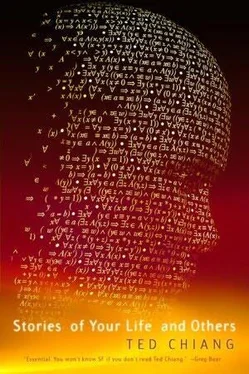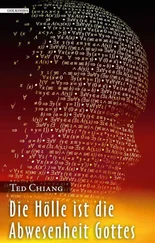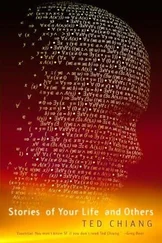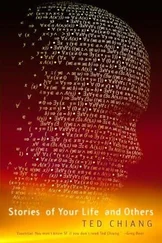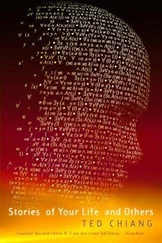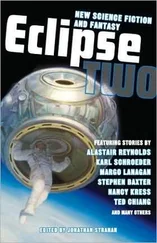Understand
a novelette
by Ted Chiang
Ted Chiang writes…
The initial impulse to write “Understand” arose from an offhand remark made by my roommate in college; he was reading Sartre's Nausea at the time, whose protagonist finds only meaninglessness in everything he sees. But what would it be like, my roommate wondered, to find meaning and order in everything you saw?
To me that suggested a kind of heightened perception, which in turn suggested superintelligence. I also thought about how the differences between human cognition and animal cognition are greater than any test can measure, and I began to wonder what might characterize superhuman cognition.
I submitted “Understand” to various magazines but received only form-letter rejection slips, so I put it away. Later, while attending the Clarion writing workshop, I showed it to Spider Robinson, who was convinced I should send it out again. I eventually incorporated the suggestions he made, along with those of Kate Wilhelm and Damon Knight, and was able to sell the story. It won the Asimov's Reader's Choice Award for Best Novelette in 1991, and was a finalist for the Hugo.
A layer of ice; it feels rough against my face, but not cold. I've got nothing to hold on to; my gloves just keep sliding off it. I can see people on top, running around, but they can't do anything. I'm trying to pound the ice with my fists, but my arms move in slow motion, and my lungs must have burst, and my head's going fuzzy, and I feel like I'm dissolving—
I wake up, screaming. My heart's going like a jackhammer. Christ. I pull off my blankets and sit on the edge of the bed.
I couldn't remember that before. Before I only remembered falling through the ice; the doctor said my mind had suppressed the rest. Now I remember it, and it's the worst nightmare I've ever had.
I'm grabbing the down comforter with my fists, and I can feel myself trembling. I try to calm down, to breathe slowly, but sobs keep forcing their way out. It was so real I could feel it: feel what it was like to die.
I was in that water for nearly an hour; I was more vegetable than anything else by the time they brought me up. Am I recovered? It was the first time the hospital had ever tried their new drug on someone with so much brain damage. Did it work?
——————————————————————————
The same nightmare, again and again. After the third time, I know I'm not going to sleep again. I spend the remaining hours before dawn worrying. Is this the result? Am I losing my mind?
Tomorrow is my weekly checkup with the resident at the hospital. I hope he'll have some answers.
——————————————————————————
I drive into downtown Boston, and after half an hour Dr. Hooper can see me. I sit on a gurney in an examining room, behind a yellow curtain. Jutting out of the wall at waist-height is a horizontal flatscreen, adjusted for tunnel vision so it appears blank from my angle. The doctor types at the keyboard, presumably calling up my file, and then starts examining me. As he's checking my pupils with a penlight, I tell him about my nightmares.
“Did you ever have any before the accident, Leon?” He gets out his little mallet and taps at my elbows, knees, and ankles.
“Never. Are these a side effect of the drug?”
“Not a side effect. The hormone K therapy regenerated a lot of damaged neurons, and that's an enormous change that your brain has to adjust to. The nightmares are probably just a sign of that.”
“Is this permanent?”
“It's unlikely,” he says. “Once your brain gets used to having all those pathways again, you'll be fine. Now touch your index finger to the tip of your nose, and then bring it to my finger here.”
I do what he tells me. Next he has me tap each finger to my thumb, quickly. Then I have to walk a straight line, as if I'm taking a sobriety test. After that, he starts quizzing me.
“Name the parts of an ordinary shoe.”
“There's the sole, the heel, the laces. Um, the holes that the laces go through are eyes, and then there's the tongue, underneath the laces…”
“Okay. Repeat this number: three nine one seven four—”
“—six two.”
Dr. Hooper wasn't expecting that. “What?”
“Three nine one seven four six two. You used that number the first time you examined me, when I was still an inpatient. I guess it's a number you test patients with a lot.”
“You weren't supposed to memorize it; it's meant to be a test of immediate recall.”
“I didn't intentionally memorize it. I just happened to remember it.”
“Do you remember the number from the second time I examined you?”
I pause for a moment. “Four zero eight one five nine two.”
He's surprised. “Most people can't retain so many digits if they've only heard them once. Do you use mnemonic tricks?”
I shake my head. “No. I always keep phone numbers in the autodialer.”
He goes to the terminal and taps at the numeric keypad. “Try this one.” He reads a fourteen-digit number, and I repeat it back to him. “You think you can do it backwards?” I recite the digits in reverse order. He frowns, and starts typing something into my file.
——————————————————————————
I'm sitting in front of a terminal in one of the testing rooms in the psychiatric ward; it's the nearest place Dr. Hooper could get some intelligence tests. There's a small mirror set in one wall, probably with a video camera behind it. In case it's recording, I smile at it and wave briefly. I always do that to the hidden cameras in automatic cash machines.
Dr. Hooper comes in with a printout of my test results. “Well, Leon, you did… very well. On both tests you scored in the ninety-ninth percentile.”
My jaw drops. “You're kidding.”
“No, I'm not.” He has trouble believing it himself. “Now that number doesn't indicate how many questions you got right; it means that relative to the general population —”
“I know what it means,” I say absently. “I was in the seventieth percentile when they tested us in high school.” Ninety-ninth percentile. Inwardly, I'm trying to find some sign of this. What should it feel like?
He sits down on the table, still looking at the printout. “You never attended college, did you?”
I return my attention to him. “I did, but I left before graduating. My ideas of education didn't mesh with the professors'.”
“I see.” He probably takes this to mean I flunked out. “Well, clearly you've improved tremendously. A little of that may have come about naturally as you grew older, but most of it must be a result of the hormone K therapy.”
“This is one hell of a side-effect.”
“Well, don't get too excited. Test scores don't predict how well you can do things in the real world.” I roll my eyes upward when Dr. Hooper isn't looking. Something amazing is going on, and all he can offer is a truism. “I'd like to follow up on this with some more tests. Can you come in tomorrow?”
——————————————————————————
I'm in the middle of retouching a holograph when the phone rings. I waver between the phone and the console, and reluctantly opt for the phone. I'd normally have the answering machine take any calls when I'm editing, but I need to let people know I'm working again. I lost a lot of business when I was in the hospital: one of the risks of being a freelancer. I touch the phone and say, “Greco Holographics, Leon Greco speaking.”
“Hey Leon, it's Jerry.”
“Hi Jerry. What's up?” I'm still studying the image on the screen: it's a pair of helical gears, intermeshed. A trite metaphor for cooperative action, but that's what the customer wanted for his ad.
Читать дальше
